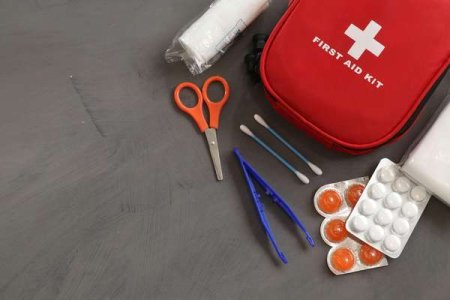Is Your Go-Bag Ready? The Ultimate Lifesaving Checklist You Need Now!
By
Aubrey Razon
- Replies 0
In the blink of an eye, the world can turn upside down. Wildfires rage, hurricanes howl, and storms batter our sense of security. For those of us who've witnessed the decades roll by, we know that nature's fury is as unpredictable as it is certain.
That's why preparedness isn't just a buzzword at The GrayVine—it's a lifeline. As we age, the need to be ready for the unexpected becomes even more critical. So, let's roll up our sleeves and ensure we're equipped for whatever comes our way!
Before we dive into the nuts and bolts of your go-bag and disaster kit, it's crucial to understand the specific threats you face. Geography plays a big part in this.
If you're nestled along the coast, hurricanes might be your primary concern. In the heartland? Tornadoes could be knocking at your door. And in the West, wildfires are an ever-present danger.
Use tools like the American Red Cross's disaster assessment or FEMA's flood maps to pinpoint your risks.
Once you've mapped out your threats, it's time to build your arsenal against them. Your disaster kit isn't a one-size-fits-all; it's a personalized cache of survival essentials.
Your disaster kit is your home base, your stronghold of supplies that will see you through when the lights go out and the water stops running. Ready.gov has laid out a solid foundation, but let's expand on that with some GrayVine wisdom:
1. Water: One gallon per person per day for at least three days, for drinking and sanitation.
2. Food: A three-day supply of non-perishable food items. Think canned goods with pop-tops, dry cereal, and energy bars.
3. Battery-powered or hand-crank radio and a NOAA Weather Radio with tone alert.
4. Flashlight: LED ones last longer and are more durable.
5. First aid kit: Include personal medications and glasses.
6. Extra batteries: Consider rechargeable ones and a solar charger.
7. Whistle: To signal for help.
8. Dust mask: To help filter contaminated air.
9. Plastic sheeting and duct tape: To shelter in place.
10. Moist towelettes, garbage bags, and plastic ties: For personal sanitation.
11. Wrench or pliers: To turn off utilities.
12. Manual can opener: For food.
13. Local maps: Don't rely on digital devices.
14. Cell phone with chargers and a backup battery.
Include extra assistive devices, like canes or hearing aid batteries. Have a list of medications and dosages, as well as a supply of over-the-counter medications you frequently use.
Pets are family, and they need their own go-bag. Include food, water, a bowl, leash, and any medications. Keep a photo of you with your pet in case you're separated, and make sure their tags and microchips are up to date.
When it's time to hit the road, your go-bag is your quick getaway companion. It's lightweight, portable, and ready at a moment's notice. Here's what to pack:
1. Non-perishable snacks and water bottles.
2. Small first-aid kit and personal hygiene items.
3. Copies of important documents in a waterproof container: IDs, insurance policies, and bank account records.
4. Cash in small denominations.
5. Emergency blanket.
6. Clothing: A change of clothes and sturdy shoes.
7. House keys and car keys.
8. Prescription medications and a list of them.
9. Chargers for your mobile devices.
10. A book or a deck of cards to keep your mind occupied.
Disaster doesn't adhere to a calendar. Winter storms, spring floods, summer wildfires—each season brings its own set of challenges. By talking about disasters before they strike and planning ahead, we can navigate the chaos with grace and grit.
Remember, the best time to prepare was yesterday. The next best time is now. Let's empower ourselves and each other to face the future with confidence and readiness. Because when disaster knocks on our door, we'll be ready to answer with strength and resilience.

We’d love to hear from you! Share your disaster preparedness tips or tell us about a time when your preparedness paid off.
That's why preparedness isn't just a buzzword at The GrayVine—it's a lifeline. As we age, the need to be ready for the unexpected becomes even more critical. So, let's roll up our sleeves and ensure we're equipped for whatever comes our way!
Understanding Your Risks and Tailoring Your Kit
Before we dive into the nuts and bolts of your go-bag and disaster kit, it's crucial to understand the specific threats you face. Geography plays a big part in this.
If you're nestled along the coast, hurricanes might be your primary concern. In the heartland? Tornadoes could be knocking at your door. And in the West, wildfires are an ever-present danger.
Use tools like the American Red Cross's disaster assessment or FEMA's flood maps to pinpoint your risks.
Once you've mapped out your threats, it's time to build your arsenal against them. Your disaster kit isn't a one-size-fits-all; it's a personalized cache of survival essentials.
The Essentials: Building Your Disaster Kit
Your disaster kit is your home base, your stronghold of supplies that will see you through when the lights go out and the water stops running. Ready.gov has laid out a solid foundation, but let's expand on that with some GrayVine wisdom:
1. Water: One gallon per person per day for at least three days, for drinking and sanitation.
2. Food: A three-day supply of non-perishable food items. Think canned goods with pop-tops, dry cereal, and energy bars.
3. Battery-powered or hand-crank radio and a NOAA Weather Radio with tone alert.
4. Flashlight: LED ones last longer and are more durable.
5. First aid kit: Include personal medications and glasses.
6. Extra batteries: Consider rechargeable ones and a solar charger.
7. Whistle: To signal for help.
8. Dust mask: To help filter contaminated air.
9. Plastic sheeting and duct tape: To shelter in place.
10. Moist towelettes, garbage bags, and plastic ties: For personal sanitation.
11. Wrench or pliers: To turn off utilities.
12. Manual can opener: For food.
13. Local maps: Don't rely on digital devices.
14. Cell phone with chargers and a backup battery.
Special Considerations for Seniors and Those with Disabilities
As we age, our needs evolve. If you or a loved one has mobility issues, hearing or vision impairments, or other disabilities, your kit should reflect that.Include extra assistive devices, like canes or hearing aid batteries. Have a list of medications and dosages, as well as a supply of over-the-counter medications you frequently use.
Don't Forget Your Furry Friends
Pets are family, and they need their own go-bag. Include food, water, a bowl, leash, and any medications. Keep a photo of you with your pet in case you're separated, and make sure their tags and microchips are up to date.
The Go-Bag: Your Emergency Escape Kit
When it's time to hit the road, your go-bag is your quick getaway companion. It's lightweight, portable, and ready at a moment's notice. Here's what to pack:
1. Non-perishable snacks and water bottles.
2. Small first-aid kit and personal hygiene items.
3. Copies of important documents in a waterproof container: IDs, insurance policies, and bank account records.
4. Cash in small denominations.
5. Emergency blanket.
6. Clothing: A change of clothes and sturdy shoes.
7. House keys and car keys.
8. Prescription medications and a list of them.
9. Chargers for your mobile devices.
10. A book or a deck of cards to keep your mind occupied.
Planning and Communication: The Glue That Holds It All Together
Having the supplies is one thing, but knowing what to do with them is another. Discuss your disaster plan with family and friends. Decide on a meeting place if you're separated and establish an out-of-town contact everyone can check in with. Practice evacuating your home twice a year, and remember to update your kit as your needs change.Disaster doesn't adhere to a calendar. Winter storms, spring floods, summer wildfires—each season brings its own set of challenges. By talking about disasters before they strike and planning ahead, we can navigate the chaos with grace and grit.
Remember, the best time to prepare was yesterday. The next best time is now. Let's empower ourselves and each other to face the future with confidence and readiness. Because when disaster knocks on our door, we'll be ready to answer with strength and resilience.
Key Takeaways
- It is essential to prepare a disaster kit and go-bag with basic items your household may need, as disasters can leave you without power or safe running water for days.
- Specific disasters are more likely in certain geographic areas, hence it is important to understand the risks pertinent to your location and prepare accordingly.
- Ready.gov provides a checklist for a disaster supply kit, and it is advisable to include prescription medications, extra face masks due to the pandemic, and supplies for pets if applicable.
- Households should discuss and plan for disasters, including evacuation routes and emergency contacts, and ensuring everyone knows where the emergency supply kit is stored. September is National Preparedness Month, but the risks of disasters persist year-round.
We’d love to hear from you! Share your disaster preparedness tips or tell us about a time when your preparedness paid off.







